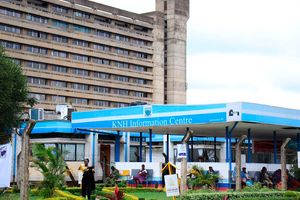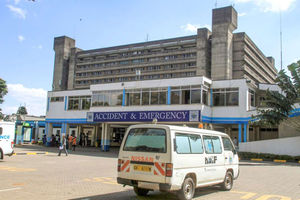
The entrance to the Accident and Emergency unit at Kenyatta National Hospital in Nairobi.
Kenyans are yet to reap the benefits of a Sh3.6 billion East Africa Kidney Institute Centre of Excellence.
Despite heavy investment in infrastructure and resources, the project has failed to take off, leaving training, research and patients needing specialised kidney treatment without access to the promised services.
According to the Auditor-General’s report of the 2023/2024 financial year, the government paid Sh2.79 billion for goods and services to set up the institute. As of June 30, 2024, the project was incomplete.
The project, which was to run for five years from December 2014, was financed through a Sh3.34 billion loan and Sh334 million in government funding, bringing the total cost to Sh3.67 billion. However, despite the official completion date passing six years ago, the centre remains non-functional.

Auditor-General Nancy Gathungu at a meeting in Mombasa County on February 4, 2025.
Meanwhile, the government has already begun repaying the loan, raising concerns over wasted public funds and lack of accountability.
The delay has denied patients access to crucial treatment services, forcing many to seek expensive dialysis and kidney transplants in private hospitals.
“In the circumstances, citizens may not have received value for money due to the delayed project implementation and the project’s objective of focusing on health problems including infectious diseases may not have been realised,” the report states.
Health experts have criticised the government for failing to operationalise the facility, questioning why a project of such magnitude would remain idle while kidney disease is a growing public health concern in Kenya. Thousands of patients require dialysis and kidney transplants every year.
Dr Jonathan Wala, a nephrologist and chairperson of the Kenya Renal Association told the Nation that the idea of the East Africa Kidney Institute Centre of Excellence was to ensure training and research and better treatment outcomes in managing kidney patients, not only in Kenya but in the East Africa region.
“This has since faced major hindrances with its implementation and there is a building which was built and equipment placed inside it that has never been used. This could have facilitated patients and even researchers if the project had been more organised,” Dr Wala said. “Unfortunately, patients will have to wait and get used to what they can currently get in the country.”
Nation.Africa has also learnt that there are five Ministry of Health officials who are attached to the institute and are earning salaries.
“This is Kenya for you. We have people who are attached to that building doing nothing and they are being paid by taxpayers’ money,” said an insider who sought anonymity.
The project comprised a five-storey medical school with wards, laboratories, surgical theatres, high-dependency units, consultation rooms and parking yards.








